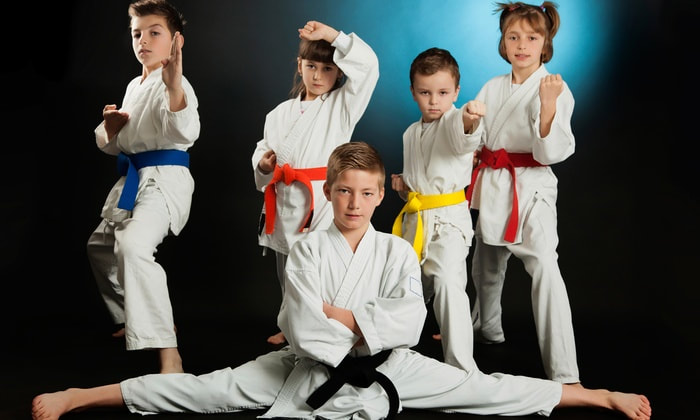|
Self-esteem develops over time.
And if it's low, it can be raised. Here are things parents can do: Help your child learn to do things. At every age, there are new things for kids to learn. Martial Arts is one of the best sports you can enroll your child because they will be learning all the time while having fun. Learning basics, the proper way to exercise, traditional martial arts kata and self defense are all skills that increase competence. Competence increased confidence and self esteem. When coaching kids how to do things, show and help them at first. Then let them do what they can, even if they make mistakes. Be sure your child has lots of opportunities to learn, try, and feel proud. Don't make new challenges too easy — or too hard. Holding pads too high for them to reach may seem funny but can also lead them to believe that they are not talented. Praise your child, but do it wisely. Of course, it's good to praise kids. Your praise is a way to show that you are proud, too. But research shows that some ways of praising kids can actually backfire. At our martial arts school we use a technique called a praise sandwich. We praise effort, make a correction and the praise improvement after the child practices more. Here's how to do it right: Avoid over-praising. Praise that doesn't feel earned doesn't ring true. For example, telling a child he kicked almost straight up when he knows he didn't feels hollow and fake. It's better to say, "I know that was a tough class, but we all have off days. I'm proud of you for not giving up." Add a vote of confidence, "Tomorrow, you'll be back on your game." Praise effort rather than fixed qualities. Avoid focusing praise on results such as doing the best in class or fixed qualities (such as being smart or athletic). This kind of praise can lead kids to avoid challenges that may threaten the good 'reputation' they get praised for most. Instead, offer most of your praise for effort, progress, and attitude. For example: "You're working hard on that split," or, "You're getting better and better at these combinations," or, "I'm proud of you for practicing and going to classes — you've really stuck with it. This kind of praise encourages kids to put effort into things, work toward goals, and try. When kids do that, they are more likely to succeed. Be a good role model. When you put effort into everyday tasks (like raking the leaves, making a meal, cleaning up the dishes, or washing the car), you're setting a good example. Your child learns to put effort into doing homework, cleaning up toys, or doing great stances. , Modeling the right attitude counts, too. If you train in martial arts along with your child, get excited about the classes (or at least without grumbling or complaining), you teach your child to do the same. Ban harsh criticism. The messages kids hear about themselves from others easily translate into how they feel about themselves. Harsh words ("You're so lazy!") are harmful, not motivating. When kids absorb negative messages about themselves, they feel bad about themselves, and act accordingly. Focus on strengths. Pay attention to what your child does well and enjoys. Make sure your child has opportunities to develop these strengths. Nurturing strengths is better than focusing on weaknesses if you want to help kids feel good about themselves and succeed. All students progress at different rates at different point in their martial arts journey. It’s not a belt race it’s all about becoming a black belt over time not “getting” a black belt
0 Comments
By Mark Silva, GetStudents.com
I started taking martial arts lessons with my dad in our living room when I was about 7 years old. We had just moved to Florida and I was starting at a new school midway through the year. I was probably the shortest kid in my class. Scrawny little arms, big wobbly head. I knew I was going to have to let time take care of most of those things, but I wanted to be good at karate ASAP. I had to get in shape. I needed to do some push-ups at the very least. I met all my friends when my dad finally opened his first karate school in our new town. I had a slight advantage over the other kids because I was pretty close to the instructor. But then older, taller, and more athletic students started joining me in class. I knew I had to step my game up to be able to compete. I was inspired by watching them kick higher than me. I was inspired by hearing them yell louder than me. I knew I had to try harder. At the very least, I could do some push-ups. After a few years of training and competing in tournaments it was time to reach my ultimate goal: BLACK BELT. At that point I was really good at doing my forms. I had all of the techniques memorized. I was growing and I was in pretty good shape. There was one thing hanging over my head...I knew I had to do 100 push-ups to complete my belt test. I practiced every day. I pushed myself harder than ever in class. I did push-ups in my bedroom before school every morning. Fitness isn’t always fun, but it feels great and it makes you a better, healthier person. I wanted to be able to knock out those push-ups faster than anyone else. I reached my goal. I am a BLACK BELT. I’m a grown man now, but I still have a lot of the same goals. This year I plan on eating healthier things I cook at home. I plan on running more, going on more walks, swimming in the ocean, staying active! Let’s set these goals together. If we keep an eye on each other we can make them all a reality this year. Good things come to those who sweat! Focus is a skill we all begin to learn on day one of our martial arts classes. We quickly understand that having good focus will be super important to learning our forms, improving our techniques, and moving through belt ranks. Focus is the ability to concentrate without being distracted.
Parents: When watching classes you will see the kids standing at attention, sitting with their hands still or kneeling with their hand on their knees. The goal is to put kids in a position when learning so they can't be distracted by other kids moving, using their arms, squiggling around or being restless. Once the body is focused we teach the children to keep their eyes on the instructor. One of the cues we use is to yell out "Eyes on who?" the kids respond "Eyes on you!" Kids learn that their eyes must be on the person talking. This is taught in class and of course we remind the kids to do this at home and at school. Then we teach them to "focus their mind." The idea is that when distractions are at a minimum the children find it easier to concentrate. I want you to focus on the future. I want you to focus on your goals. You become what you think about the most. If you think about all the negative things in your life or remarks you hear, you tend to notice them more and more. I want you to focus on positive thinking and the things you do well. This will come around and help you improve the things that need work. We asked kids in an online survey: "What should a coach care about most?" You might expect them to answer "to focus on winning." But "Put me in, coach!" is what most kids really want.
In fact, the majority didn't think winning was all that important. Only 7% of girls said coaches should be most concerned with winning, while about 18% of boys said so. Here's what boys and girls value most in a coach: 64% said giving everyone a chance to play 27% said teaching new skills 9% said winning Striving for excellence is a great goal, but when coaches and parents apply too much pressure, kids can get overly worried or push themselves too hard physically, leading to injuries. Some kids may even go on unhealthy diets to lose or gain weight to be better at their sport. And when sports become too competitive, kids who have only average or below-average skills might spend too much time on the bench instead of learning new skills. 10th Degree master instructor Greg Silva says, "I have been a martial arts instructor for 46 years. I believe there are no better coaches than martial arts teachers." Martial Arts instructors know that the door to success open "in" not "out". That means the success to building an athlete who is well balanced yet understands that being in top shape and a top performer begins with the proper attitude, confidence, self esteem, sportsmanship and self control. This building from the "inside out" will prevent kids from being lazy, giving up, or quitting. The nature of martial arts with setting continuous goals is a key to it's success. And there is no bench to sit on. All kids learn, train and compete while playing the "game" in every class they take. To see how martial arts teaches so much, join us in our free "Beginners Martial Arts" Workshop Martial Arts helps kids learn to stick with things and have fun along the way. Through a series of goal setting and learning new skills kids are constantly motivated, inspired and gain competence. I have personally trained 100 or more black belt kids. They all have gained skills like self esteem, confidence, courage, tenacity and perseverance. Parents tell me things like, "Of course the kids have highs and lows in training. Many have wanted to quit along the way. But that's okay. It's okay to want to quit." The real important things is to team up with the parents, child and instructor to make sure the child doesn't quit when that feeling come along. Quitting. We quit jobs, we quit marriages, we walk out on friendships and sometimes we let people down when the going gets tough. Sometimes it is necessary, even the right thing to do. Our kids quit teams and music lessons, art classes and after school programs.
Sometimes it’s necessary, but sometimes they are bored or don’t like the coach or would just rather play video games at home. Deciding when to let your kids quit something, be it Gymboree, Little League or SAT prep, is a question that never goes away. My kids have tried it all. I have driven them to sports, found drum teachers, glass blowing lessons, painting and ceramics classes. They have tried their hands at their school newspapers, student government, ESL tutoring and computer programming camp, though why that qualifies as camp, I am sure that I will never know. In the end, they did not commit to most of these activities, but at the same time, I never let them quit a single activity. Our rule is simple: Try any activity that we have the resources to make possible. Go once, go even twice but if you commit, I told my kids, there will be no quitting. At the risk of overgeneralizing, I think our children have so many choices of ways to enrich their lives that sometimes kids quit an activity as an easy response to frustration or boredom. I regret many of the things in life that I quit, not because I was enjoying them when I left, but because if I had stuck it out and reached any sort of competency, I might have found that elusive enjoyment. In reality, this meant that my kids had to stick with the team until the season ended or an art class until the sessions ended. There was no walking out on computer camp because it was dumb or quitting drums because we recognized a dearth of musical talent. Every activity was to be seen through to completion. Why was I so tough on them? Why draw what might seem like an arbitrary line in the sand? Constancy, commitment and loyalty are all values I hoped to instill in my sons. Learning to endure something even when it became boring or unpleasant, when the coach or teacher didn’t like my kid, or vice versa, seemed a lesson truly worth teaching. I thought that the first time I let them walk away from something just because at that moment it didn’t suit them was the last time I had any credibility about endurance or resilience because the refrain henceforth would have been, “but you let me quit….” Over time, my kids learned they were never going to be allowed to quit things so they should be careful about what they committed themselves to, because the word commit was going to be taken literally. The result? Good things and bad. Perhaps they didn’t try things they might have, although we usually made clear up front that you could try something (say by going once or twice) but after they signed up we were done with discussions. But we had bad days, really frustrating end-of-my-rope days. There were tantrums and miserable practices and screaming scenes where I reminded them that this was something they had said they wanted to do. The upside? They had long, enduring relationships with instructors, coaches and teammates who changed and enriched their lives. One high school son has been on the same soccer team for nine years. It is the stuff that childhood memories are made of. I sound so confident now, but on a weekly and sometimes daily basis I was wracked by self-doubt and misgivings and even now am not sure if what I did was right. The one thing that I have observed is this: My college-age sons have true passions, things they study in school and activities they are involved in outside of the classroom. Passions are not like dreams for most of us, we don’t wake up one morning and find they have miraculously come to us in the night. Parents often talk about helping kids find their passions. But passions do not always reveal themselves unbidden, as often they are a result of hard work and dedication, the joy that comes of doing something well. My kids’ passions are the result of endless hours spent learning a subject or mastering a skill. In each case, it is something that in childhood they begged and pleaded with me to quit and in late adolescence they have told me how much they enjoy. I made them stick things out because mastery, even at a child’s level takes time and repetition. Competence breeds confidence but success and accomplishment breed self-esteem and social well-being. One of my college kids, by his choice, still plays on a soccer team. Yet in a particular parenting low point, I pushed his 12-year-old self out of the car to make him play when the practices had ramped up and become far more difficult. From Grown and Flown From The Well Armed Woman
There are some basic defensive tips every women should know and make part of their daily lives. BE AWARE OF YOUR SURROUNDINGS Self defense begins before you even know you need it. Always and in all situations, from going to the grocery store to finding your car in a dark parking lot - scan and be aware of what and who is around you and know where you are. Observe and think "what if?". What if someone jumped out at you from behind that car? What would you do? Part of what makes a women vulnerable to attack is the appearance of not paying attention, or appearing uncomfortable. Projecting a confident attentive presence can be a powerful deterrent. We are creatures of habit. It is far too easy to be lax in familiar surroundings and we lose the edge of really checking our surroundings and looking for anything unusual - especially in and around our own neighborhoods, homes, workplaces and cars. Many women are stalked and their habits watched over a period of time to take advantage of when their guard is likely down. LISTEN TO YOUR GUT We as women, have powerful instincts - trust them and use them to your advantage. If something or someone does not "feel" safe - you are probably right and should take steps to avoid them. Do not concern yourself with what other's will think that it is a silly, paranoid thought. Listen to your gut and act accordingly. DON'T DAWDLE Have your keys out and ready before starting for the parking lot or your front door. Don't wait until you get in your car to begin the typically long search for your keys in your purse. Don't organize your purchases or review your receipts in the car or do anything that keeps you from locking the doors, starting the engine and leaving immediately. Review your receipts before leaving the store and place your bags in the car quickly. Lock your doors and make sure your car windows are up immediately upon entering the car. Once you enter your home, shut the door and lock it immediately, even if it means making multiple trips to the car to unload your purchases. Take the time to lock the doors each trip. Know where you are going and be ready with keys or whatever you may need before you get there. BE PREPARED FOR FLIGHT OR FIGHT Being in the mindset that you will fight to protect yourself and knowing how you will do that ahead of time not only gives you greater confidence but increases your chance of successfully defending yourself. Escape is always the best option. Being aware and thinking defensively will help you to see "the possibilities" of flight or fight before anything happens. I would suggest that if you choose to carry a firearm, that you take an armed personal defense course and if you do not carry a firearm, a basic self defense course is highly recommended. These self-defense programs should include simulated assaults with a fully padded instructor in realistic rape and attack scenarios, to allow you to practice what you've learned. STRANGER DANGER Just as we teach our children to stay away from strangers, we need to practice what we teach. Keep your distance when walking past strangers and be observant and mentally prepared. If a car pulls up and needs assistance, keep a very safe distance if you choose to offer help - or simply keep moving. With the internet becoming one of the most common ways we meet new people, extreme caution should be used when giving out any personal information or addresses. Everyone and anyone can look and seem "safe" online. Trust no one. PROTECTING YOURSELF AT HOME Home invasion crimes are on the rise. The best way to prevent a home invasion is to always keep your doors and windows locked with effective locks and to simply never, ever open your door unless you either are certain you know who's on the other side or you can verify that they have a legitimate reason for being there. Many criminals will dress up as a repair man or even a police officer. You can call the company or the police station to verify before opening your door. In the event that an intruder breaks in while you're home, you should have a safe room in your house to which you can retreat. Such a room should be equipped with a strong door, deadbolt lock, phone (preferably cell phone), and a can of pepper spray, fire extinguisher or safely stored firearm. Contact us today - we can help prepare you for real world self-defense situations! According to KidsHealth.org when children feel good about themselves, it sets them up for success — in everything from school to friendships. Positive feelings like self-acceptance or self-confidence help kids try new challenges, cope with mistakes, and try again. Taking pride in their abilities and accomplishments helps kids do their best.
By contrast, kids with low self-esteem might feel unsure of themselves. If they think others won't accept them, they may not participate as often. They may allow themselves to be treated poorly and have a hard time standing up for themselves. Kids who don't expect to do well may avoid challenges, give up easily, or be unable to bounce back from mistakes. Having low self-esteem can block success. It can leave kids distracted by the stress of how to deal with everyday challenges. How Self-Esteem Develops Contrary to what some might think, self-esteem does not come telling kids they're wonderful, special, and great (even though they are!). Giving every child a trophy doesn't help kids' self-esteem. Indeed, it's possible for kids to feel good about themselves even when they fail. When children compete — win or lose — they see that their own hard work and practice can make a difference. Earning a prize contributes to self-esteem only when a kid knows he or she earned it. Self-esteem is the result of experiences that help a child feel capable, effective, and accepted. How Martial Arts training can help When kids learn to do things for themselves and feel proud of what they can do, they feel capable. Martial Arts is fun to learn and performing moves with a class build competence and then confidence. Children feel effective when they see that good things come from efforts like trying hard, getting close to a goal, or making progress. Earning belts in martial arts is all about goal setting and teaches kids that hard work and effort pays off. When kids feel accepted and understood by a parent or someone close, they are likely to accept themselves, too. Their good feelings about themselves multiply as their sensei or teacher praise good behaviors, help when needed, and give encouragement and support. Students in martial arts support and encourage each other. Events like graduations, social events and being part of a team of other positive kids is all part of Martial Arts. Please call or click here for a free class and tour of our school • Your child comes home missing things or his property has been damaged
• Has injuries he can’t or doesn’t want to explain. • Has not interaction with other kids after school. • Seems nervous taking a school bus or walking to school. • Finds or makes up excuses as to why they can’t go to school • Takes alternate routes home • School grades are slipping • Appears lonely or sad. • Complains frequently of headaches, stomachaches or other physical ailments • Loss of appetite • Has lost self confidence. Note: Children with disabilities may be at a higher risk of being bullied than other children. Noticing signs like these are your cue to talk to your child and his teacher or counselor. When talking to your child be sure to connect first. Example - I’ve been seeing a lot of news reports about bullying. It scares me. Is this type of behavior happening at your school? Are you or your friends having any problem with others picking on you? Who are some of your friends at school? Any kids at school you don’t like? Why don’t you like them? Follow up with the teacher and ask how your child does socially in school? Who he is friends with? Does the teacher think your child could be bullied or teased? Continue to seek help. If these signs are not those of being bullied you will want to find out what is causing them. If he is being bullied take some action steps to rebuild his confidence self esteem and possibly his self defense skills before things get physical. To stay healthy or improve health, adults need to do two types of physical activity each week: aerobic and strength exercises.
To stay healthy, adults should try to be active daily and should do: at least 150 minutes of moderate aerobic activity such as cycling or brisk walking every week, and strength exercises on two or more days a week that work all the major muscles (legs, hips, back, abdomen, chest, shoulders and arms) 75 minutes of vigorous aerobic activity, such as running or a game of singles tennis every week, and strength exercises on two or more days a week that work all the major muscles (legs, hips, back, abdomen, chest, shoulders and arms) A mix of moderate and vigorous aerobic activity every week. For example, two 30-minute runs plus 30 minutes of brisk walking equates to 150 minutes of moderate aerobic activity, and strength exercises on two or more days a week that work all the major muscles (legs, hips, back, abdomen, chest, shoulders and arms) A good rule is that one minute of vigorous activity provides the same health benefits as two minutes of moderate activity. One training program that's been around for 2000 years (must be good) Is martial arts. Martial Arts combines flexibility, aerobic training and strength training. 2 - 3 classes a week will provide a moderate workout for beginners and a vigorous workout for intermediate and advanced students. But there are bonuses. You will be part of a great supportive community and have the benefits of self-defense. 1. Remind yourself every day it’s a constant improvement
If you tried to sprint a marathon full force you would never make it so to apply the same mindset to maintaining weight loss is not only silly but a set up for failure. 2. Stop buying your problem foods If you have a penchant for sweet, savory, fried, or all of the above and find yourself saying, “I’ll buy just one package of [insert problem food here] so I can have some when I really want it…”, it’s time to stop. You’re creating a comfort zone for self sabotage. Just don’t buy it, okay? 3. Keep track of your nutrition when you feel you’re losing your grip Eating too much or eating too little are both equally are the nemesis of maintaining weight loss. The best way to combat that war is to keep track of your nutrition when you feel most out of control. 4. Keep track of your results.Become a “Tracker?” “That which is measured improves. That which is measured and reported improves exponentially.” -Karl Pearson If you’ve ever kept a tracking chart for anything you wanted to improve, you know this is true. The effect borders on the miraculous. Trackers find themselves taking enormous action to improve the things they track almost unconsciously. 5. Memorize this phrase, “No thanks, I just ate.” When you’re trying to make better choices regarding eating, it’s easy to get bombarded with turbulence over, “you can have just ONE” or “I heard not eating can be BAD for you” when in reality they just want you to join in on the fun. When you say “No thanks, I just ate,” it cuts down on the need to defend yourself BIG TIME. 6. Drink as much water as you can I mean it. Not only will you stay hydrated but your body will be running on all 8 cylinders keeping you constantly tuned up. 7. Ask yourself, “Will I be happy with that decision an hour from now?” Odds are the answer is no and it helps to focus on the outcome rather than the instant gratification. If the answer is yes, then that’s what you should be doing! Self accountability at it’s finest. 8. Establish an accountability buddy It helps knowing that someone else understands the struggle of maintaining a healthy lifestyle and having an appointed friend you can call or text in that moment of weakness can do wonders for talking yourself off the ledge. Even if you don’t call/text it’s a great tool just knowing you can. 9. Get rid of all your bigger sized clothing You don’t need that safety net anymore and when you have no choice to get back on track unless you want to buy a whole new wardrobe, it can be motivating to get back on the health wagon. 10. Never give up on yourself Believe you are the person you want to be already. You just may have gotten a little off track. You need to love yourself in order to want the best for yourself |
LocationEl Paso Karate
10710 Gateway North, STE B4 El Paso, Texas 79924 |
HoursMonday 2:00 - 8:00pm
Tuesday 2:00 - 8:00pm Wednesday 2:00 - 8:00pm Thursday 2:00 - 8:00pm Friday 2:00 - 8:00pm Saturday Closed Sunday Closed |
Contact UsPhone: 915-822-8818
|
Built by Get Students
© COPYRIGHT 2017-2020. ALL RIGHTS RESERVED.
© COPYRIGHT 2017-2020. ALL RIGHTS RESERVED.




